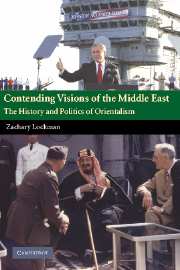Book contents
- Frontmatter
- Contents
- List of maps
- Acknowledgments
- 1 The rise of Islam and the Arab conquests
- 2 The Ottoman empire to 1566
- 3 The Middle East and North Africa on the eve of the First World War
- 4 The Middle East and North Africa between the Two World Wars
- 5 The Middle East and North Africa – boundaries
- 6 The Middle East and North Africa in the world
- Introduction
- 1 In the beginning
- 2 Islam, the West and the rest
- 3 Orientalism and empire
- 4 The American century
- 5 Turmoil in the field
- 6 Said's Orientalism: a book and its aftermath
- 7 After Orientalism?
- Afterword
- Notes
- Bibliography
- Index
Introduction
Published online by Cambridge University Press: 15 December 2009
- Frontmatter
- Contents
- List of maps
- Acknowledgments
- 1 The rise of Islam and the Arab conquests
- 2 The Ottoman empire to 1566
- 3 The Middle East and North Africa on the eve of the First World War
- 4 The Middle East and North Africa between the Two World Wars
- 5 The Middle East and North Africa – boundaries
- 6 The Middle East and North Africa in the world
- Introduction
- 1 In the beginning
- 2 Islam, the West and the rest
- 3 Orientalism and empire
- 4 The American century
- 5 Turmoil in the field
- 6 Said's Orientalism: a book and its aftermath
- 7 After Orientalism?
- Afterword
- Notes
- Bibliography
- Index
Summary
Perhaps it would be best to begin by explaining what this book is not. It is not, and does not purport to be, a detailed, comprehensive history of the study either of Islam or of the region that has come to be called the Middle East, as conducted by scholars and others in what has come to be called the West. Nor does it claim to be a full-scale, in-depth scholarly analysis of the origins, development, character and implications of Western perceptions of, and attitudes toward, Islam, Muslims, Arabs, Iranians, or the Middle East.
This book's purpose is much more modest. It seeks, first of all, to introduce readers to the history of the sometimes overlapping enterprises known as Orientalism, Oriental studies, Islamic studies and Middle East studies as practiced in the West, with particular attention to the United States from the mid-twentieth century onward. It does not attempt to identify or discuss all the scholars, writers, artists, travelers, texts, schools of thought or institutions involved in studying, commenting on or depicting Islam, the Middle East or the broader Orient over the past millennium and a half. Rather, it explores broad trends, some particularly influential interpretive paradigms and theoretical approaches, important debates and significant transitions, along with their political, social and cultural contexts, largely by focusing on a selection of representative individuals, illustrative texts, key institutions and important developments.
A better understanding of how the Middle East and Islam have been perceived, understood, studied and depicted would seem to be more important today than ever before, especially for Americans.
- Type
- Chapter
- Information
- Contending Visions of the Middle EastThe History and Politics of Orientalism, pp. 1 - 7Publisher: Cambridge University PressPrint publication year: 2004

